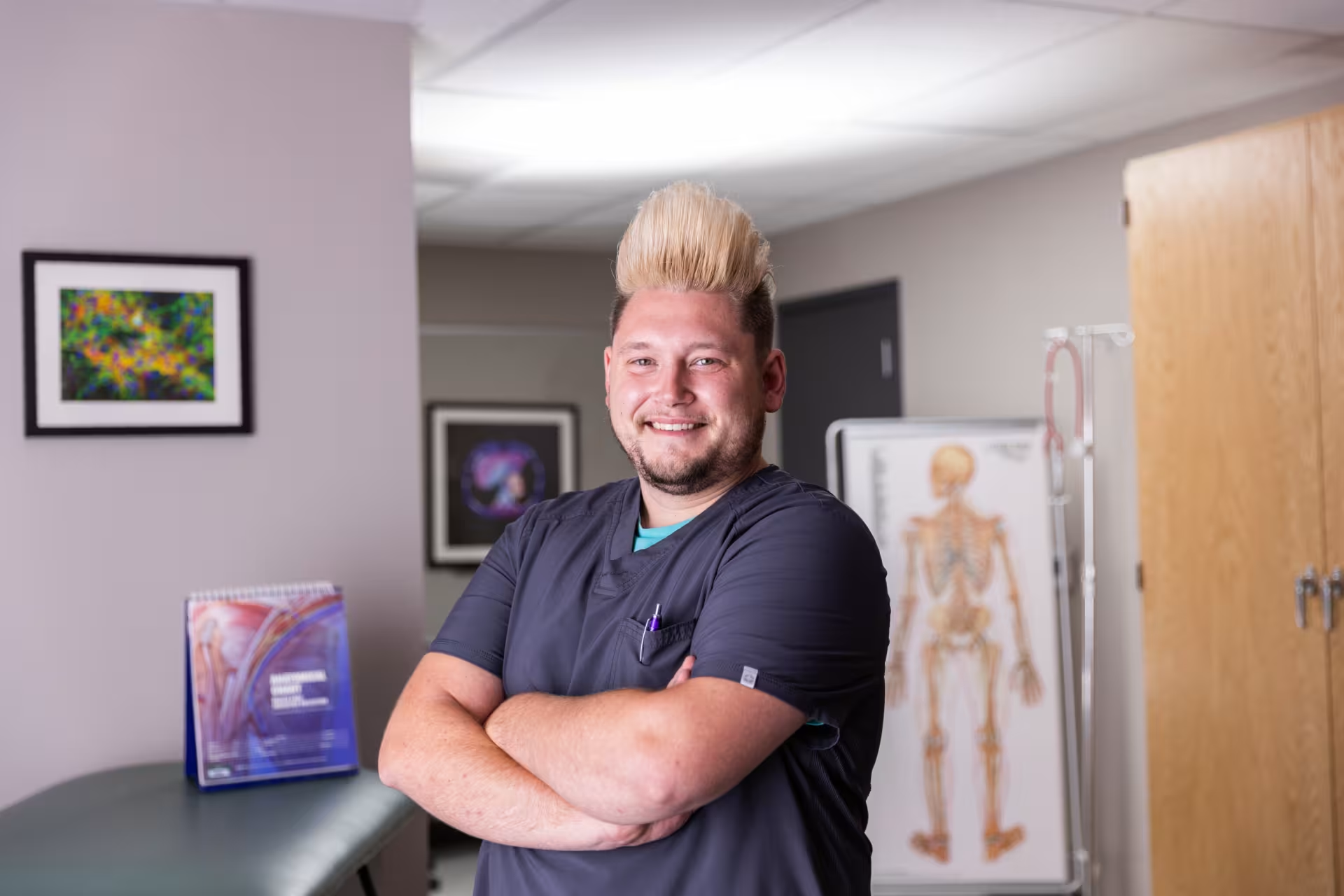
BS in Biology: Pre-Physician Assistant Emphasis
Work Toward Becoming a Physician Assistant With a Pre-PA Focus
The Bachelor of Science (BS) in Biology with an Emphasis in Pre-Physician Assistant is an undergraduate degree program at Grand Canyon University designed to help prepare you to pursue admission into a physician assistant (PA) master's degree program. These pre-PA courses focus on the sciences, healthcare and medical knowledge required to pursue a master’s degree to become a PA.
The pre-physician assistant courses place a strong emphasis on the importance of interpersonal communication. Throughout the program, you will experience hands-on learning and guidance from knowledgeable faculty, helping you prepare for the challenges of a PA master's degree. If your career goal is to become a physician assistant, this bachelor’s degree program may be the right first step for you.

Campus: $8,250 per semester [More Info]
Up to 90 credits, only 84 can be lower division
Credits: Fill out the Lopes Eval to find out what will transfer
Admission Requirements (Bachelor's)
- 16+ years old
- High School Graduate
- 3.0+ Unweighted GPA
OR 2.5+ Unweighted GPA and
- ACT: 19
- SAT: 1000*
Admission requirements may differ based on degree level, program and modality, or transfer status. Some programs of study may require a higher GPA and/or other qualifying criteria for admission. Please review full admission and program requirements in the University Policy Handbook.
*Math and reading only on a 1600 point scale (test date after 3/1/2016). SAT score of 1380 required for 2400 point scale (test date before 3/1/2016).
Earn Your Bachelor’s in Biology From GCU
Pre-physician assistant candidates who graduate from the College of Natural Sciences at GCU have been taught the essential foundational competencies for their field. The college uses five domains to ensure that the coursework for the emphasis in the pre-physician assistant pathway is effective.
Pre-PA courses aim to prepare future PAs in these domain areas:
Science foundations
Professional and scientific communication
Professionalism and ethics
Data analysis and interpretation
Advanced biomedical concepts
Take Pre-Physician Assistant Courses on Campus
As you work toward earning your Bachelor of Science in Biology degree on the GCU campus in Phoenix, you’ll be immersed within a STEM-oriented learning community that places a high priority on the quality of our healthcare education. As an on-campus student, you can benefit from academically stimulating, face-to-face discussions with your instructors and peers. You’ll also have access to all of our campus amenities, including recreational facilities and dining options, as well as extracurricular activities. GCU places an emphasis on the quality of our campus life, striving to cultivate a spirited, Christian learning community in which all are supported.
Number of GCU gyms and recreational spaces on campus (2023-24)

Topics Taught in the Pre-PA Courses
The GCU pre-PA emphasis can provide a comprehensive exposure to the essential topics needed to prepare for a future role as a physician assistant.
This program will teach you fundamentals in areas such as:
As medical providers, physician assistants must be able to draw from extensive medical knowledge to examine, diagnose and treat patients under the supervision of a physician. The quality of their education is critical, as patients are relying on PAs to provide quality medical care.
Biology Competencies
The advanced scientific concepts included in these domains are designed to enable pre-physician assistant grads to receive exposure to the competencies they need.
While you’re in this program, you will examine topics such as:
Explore Emphasis Options
Explore the various emphases in Biology from GCU
Career Paths for BS in Biology: Pre-Physician Assistant Emphasis Graduates
Graduate-level physician assistant studies are the next stop in higher education for many graduates.
The core coursework may also lead pre-physician assistant students into other allied health graduate programs, such as:
Respiratory therapy
Emergency medical sciences
Medical technology
Other Specialties
Estimated job growth for physician assistants from 2022 to 2032(See disclaimer 1)
Median annual wage for physician assistants as of May 2023(See disclaimer 2)
Graduate With a Pre-PA Emphasis From an Accredited University
As medical providers, physician assistants must be able to draw from extensive medical knowledge to examine, diagnose and treat patients under the supervision of a physician. The quality of their education is critical, as patients are relying on PAs to provide quality medical care. At GCU, we’re proud to be an institutionally accredited university, which is a reflection of our mission to provide a firm academic foundation for all of our students, including those fulfilling pre-PA requirements.
In addition, the Higher Learning Commission (HLC) has continually accredited GCU since 1968. The College of Natural Sciences shares the university’s commitment to upholding the principles and standards established by the HLC because we believe our students deserve a solid starting point from which to pursue their future career.
Pre-Physician Assistant Emphasis FAQs
Pursuing a degree with a pre-physician assistant emphasis can be the first step toward your professional career. GCU has answers to your most frequently asked questions about our bachelor’s in biology degree program.
Which bachelor’s degree do I need to become a physician assistant?
What do physician assistants major in?
What subjects will I study in a pre-PA emphasis?
What careers will a pre-physician assistant bachelor’s degree emphasis qualify me for?
Program Curriculum
General Education Requirements
Required General Education Courses
Core Courses

If you are passionate about making a positive difference in the lives of patients, a pre-physician assistant emphasis may be the right choice for you. Fill out the form on this page to learn more about this specialized Bachelor of Science in Biology degree program.
- COVID-19 has adversely affected the global economy and data from 2020 to 2022 may be atypical compared to prior years. Accordingly, data shown is effective September 2023, which can be found here: U.S. Bureau of Labor Statistics, Occupational Outlook Handbook, Physician Assistant, retrieved on Jan. 28, 2024.
- The earnings referenced were reported by the U.S. Bureau of Labor Statistics (BLS), Physician Assistant as of May 2022, retrieved on Jan. 28, 2024. Due to COVID-19, data from 2020 to 2022 may be atypical compared to prior years. BLS calculates the median using salaries of workers nationwide with varying levels of education and experience. It does not reflect the earnings of GCU graduates as physician assistant, nor does it reflect the earnings of workers in one city or region of the country or a typical entry-level salary. Median income is the statistical midpoint for the range of salaries in a specific occupation. It represents what you would earn if you were paid more money than half the workers in an occupation, and less than half the workers in an occupation. It may give you a basis to estimate what you might earn at some point if you enter this career. Grand Canyon University can make no guarantees on individual graduates’ salaries. Your employability will be determined by numerous factors over which GCU has no control, such as the employer the graduate chooses to apply to, the graduate’s experience level, individual characteristics, skills, etc. against a pool of candidates.
- U.S. Bureau of Labor Statistics. (2023, Sept. 6). How To Become A Physician Assistant. Occupational Outlook Handbook. Retrieved on Jan. 18, 2024.
- American Academy of Physician Assistants. (n.d.). Become a PA. Retrieved on Jan. 18, 2024.


